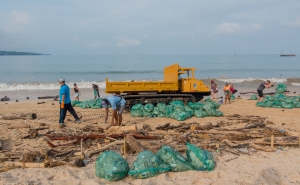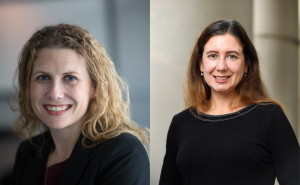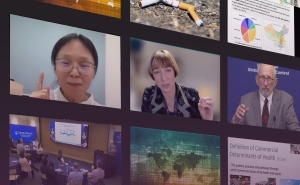Spotlight: Anthony Nicome, MHS ’21
Anthony is an Environmental Justice Fellow at the Association of American Medical Colleges’ Center for Health Justice and a doctoral student at Yale University.

After graduation, Anthony continued to work in the environmental health sciences at the United States Environmental Protection Agency (EPA) in New York City. He served in the drinking water and groundwater infrastructure division, focusing on emergency response and working directly with communities to address drinking water concerns during disaster events. He went on to work in the EPA’s Office of Community Revitalization as an Environmental Justice Coordinator, where he led an internal collaborative network focused on environmental justice. He is an Environmental Justice Fellow at the Association of American Medical Colleges’ Center for Health Justice, where he leads the development of the center’s environmental justice portfolio. He is also freelance writer for Civil Eats and is continuing his studies in the environmental health sciences at Yale University.
The most fruitful aspect of the MHS program was learning how to work directly with communities to help address a myriad of environmental health issues.
How did your degree from EHE prepare you for a career in environmental health?
My degree from EHE prepared me in so many ways. I am so thankful for my advisers, mentors, school staff and faculty, and classmates. What an exceptional program and group of people. As a Diversity Summer Internship Program summer scholar, EHE began investing in me before my matriculation into the Master of Health Science program. The department nurtured my interest in public health and provided graduate level research experience. It provided opportunities to engage in public health leadership development with an emphasis on communication and collaboration.
I gained formal skills needed to excel in my current work. I was able to learn about the diverse range of topics that fall under environmental health sciences, including risk assessment, biostatistics, epidemiology, food systems, climate change, environmental justice and beyond. Much of the focus of my studies centered on climate change, water quality, food insecurity, community engagement, sustainability and environmental justice.
The most fruitful aspect of the MHS program was learning how to work directly with communities to help address a myriad of environmental health issues. I learned how to communicate public health issues with communities I serve and translate research to action and policy, which is very present in my current work at AAMC-CHJ and as a freelance writer for Civil Eats.
What was your favorite thing about living in Baltimore or going to Johns Hopkins?
My favorite thing about the City of Baltimore and the Bloomberg School of Public Health is the people. “A House is Not a Home”, is the saying I think of when describing EHE. The people make the department and the school the amazing place it is today. During my time at EHE, I truly felt supported by all of my professors, advisers, and mentors. All my professors nurtured my eagerness to learn about the field of environmental health while ensuring that I was prepared to tackle some of our world's most pressing environmental health challenges. I admire the dedication that every student, staff, and faculty member has for working with communities to address their environmental health concerns as well as working toward creating healthier, more prosperous, and environmentally just communities. I am truly inspired by what the future holds for EHE. I am eager to see how our department continues to center health equity in all its work and rises to the occasion as the global population continues to face the reality of climate change, global pandemics, environmental injustices, and chronic diseases. Most importantly, I am hopeful for the students that graduate EHE as public health leaders, at the forefront of tackling our world's environmental health challenges, deeply committed to “Protecting Health—Saving Lives, Millions at a Time." Go Hop.
Environmental Health and Engineering is a cross-divisional department spanning the Bloomberg School of Public Health and the Whiting School of Engineering. This hybrid department is uniquely designed to lead pioneering research and prepare the next generation of scholars and professionals to solve critical and complex environmental issues. Learn more about our programs.





